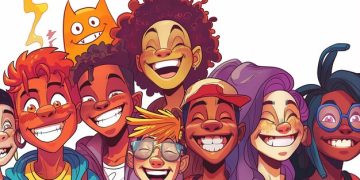The Power of Friendship in Shonen Manga: A Critical Analysis

The Power of Friendship in Shonen explores how bonds between characters drive narratives, enhance emotional impact, and contribute to the genre’s enduring popularity and cultural significance.
The shonen genre, known for its action-packed adventures and vibrant characters, often highlights a core theme: the **power of friendship in shonen**. This element not only enhances the storytelling but also resonates deeply with audiences, fostering a sense of camaraderie and shared emotional experiences.
The Foundation of Shonen: Why Friendship Matters
Friendship is more than a simple plot device in shonen manga; it’s a fundamental building block that shapes the narrative and character development. The bonds between characters provide motivation, support, and a sense of belonging, driving them to overcome challenges.
The Role of Friendship in Character Development
In many shonen series, characters start as individuals with unique strengths and weaknesses. Through their interactions and shared experiences, they learn from each other, grow as individuals, and become stronger as a collective.
Friendship as a Source of Motivation
Often, the desire to protect friends or avenge their suffering becomes a primary driving force for protagonists. This emotional connection fuels their determination and pushes them to surpass their limits.
- Shared goals and dreams strengthen bonds.
- Sacrifice and loyalty are hallmarks of true friendship.
- Overcoming adversity together builds lasting connections.
In essence, friendship in shonen serves as a lens through which characters explore their potential and achieve greatness. It provides a moral compass, fostering values like loyalty, trust, and selflessness.

The Evolution of Friendship Dynamics in Shonen Manga
Over the years, the portrayal of friendship in shonen manga has evolved, reflecting changing social values and audience expectations. Early shonen often presented idealized versions of friendship, while modern series delve into more complex and nuanced relationships.
Early Shonen: Idealized Bonds and Heroic Sacrifices
Classic shonen manga often depicted friendships as unwavering and unbreakable. Characters were willing to sacrifice everything for their friends, embodying the ultimate form of loyalty.
Modern Shonen: Complex Relationships and Internal Conflicts
Contemporary shonen series explore the challenges and complexities of friendship, including internal conflicts, misunderstandings, and the strain of balancing individual goals with collective needs.
- Rivalries within friendships add depth and tension.
- Characters grapple with personal ambitions versus group harmony.
- Trust and communication are vital in navigating challenges.
Despite these evolutions, the core values of friendship remain a central theme, demonstrating its enduring appeal and relevance.
Iconic Examples: Shonen Series That Celebrate Friendship
Many shonen series have masterfully portrayed the power of friendship, showcasing its influence on character growth, plot development, and overall thematic resonance. These examples highlight the diverse ways friendship can be depicted and its impact on readers.
Naruto: The Power of Connection and Understanding
Naruto emphasizes the importance of connection and understanding, even with those who have strayed down darker paths. Naruto’s unwavering belief in his friends and his determination to bring Sasuke back from the darkness exemplify this theme.
One Piece: The Unbreakable Bonds of the Straw Hat Pirates
One Piece showcases the unbreakable bonds of the Straw Hat pirates, a crew united by their dreams and loyalty to their captain, Luffy. Their adventures are defined by their willingness to support and protect each other.
- Luffy’s charisma inspires unwavering loyalty.
- Each crew member brings unique skills and perspectives.
- Shared dreams create a powerful sense of camaraderie.
These series, along with many others, demonstrate the transformative power of friendship in the shonen genre, resonating with audiences through relatable characters and heartfelt stories.
The Impact of Friendship on Shonen Narratives: Plot and Themes
Friendship not only affects character interactions but also significantly shapes the plot and themes of shonen manga. It provides a framework for exploring universal values and addressing complex social issues.
Friendship as a Catalyst for Plot Development
Many shonen storylines revolve around the characters’ efforts to protect their friends, rescue them from danger, or achieve a shared goal. These quests drive the narrative forward and create opportunities for character growth.
Friendship as a Vehicle for Exploring Universal Themes
Through the lens of friendship, shonen manga explores themes such as loyalty, sacrifice, redemption, and the importance of human connection. These themes resonate with audiences and provide valuable life lessons.
- Loyalty is tested through betrayal and adversity.
- Sacrifice demonstrates the depth of commitment.
- Redemption offers hope for those who have made mistakes.
Ultimately, friendship serves as a cornerstone of shonen narratives, enriching the storytelling and enhancing its emotional impact.

Criticisms and Controversies: Questioning the Limits of “Nakama”
Despite its positive portrayal, the concept of “nakama” (friendship) in shonen manga has faced criticism, particularly concerning its potential limitations and negative implications.
The Idealization of “Nakama” and Its Potential Pitfalls
Some critics argue that the idealized portrayal of friendship in shonen can be unrealistic and even harmful, setting unrealistic expectations for real-life relationships.
When Friendship Blinds: Ethical Dilemmas and Moral Compromises
In some cases, characters’ unwavering loyalty to their friends can lead to questionable ethical choices or moral compromises, raising complex questions about the limits of friendship.
- Blind loyalty can lead to overlooking flaws.
- Groupthink can stifle individual expression.
- Sacrificing personal values for the sake of friendship can be detrimental.
These criticisms highlight the need for a balanced and critical perspective on the portrayal of friendship in shonen manga, acknowledging its potential downsides alongside its many benefits.
The Cultural Impact of Friendship in Shonen: Beyond the Pages
The influence of friendship in shonen manga extends beyond the pages, shaping cultural values, inspiring real-life relationships, and fostering a sense of community among fans.
Inspiring Real-Life Friendships and Communities
Many fans attribute their own friendships and sense of community to the values espoused in shonen manga, finding inspiration in the characters’ unwavering loyalty and support for each other.
Shonen Manga as a Reflection of Social Values
The enduring popularity of friendship as a theme in shonen manga reflects its importance in social values, particularly in cultures that emphasize collectivism and group harmony.
- Friendship fosters a sense of belonging.
- Teamwork and collaboration are valued.
- Empathy and compassion are promoted.
In conclusion, the cultural impact of friendship in shonen manga is significant, demonstrating its power to shape perceptions, inspire connections, and foster a sense of community among readers worldwide.
| Key Point | Brief Description |
|---|---|
| 🤝 Friendship’s Role | Motivates characters and enhances individual growth. |
| ✨ Evolution | Moved from idealized bonds to complex relationships. |
| 🛡️ Impact | Shapes plots, explores themes, and inspires fans. |
| 🤔 Criticisms | Concerns over unrealistic ideals and ethical compromises. |
The Power of Friendship in Shonen Manga: FAQ
▼
Friendship is a central theme because it resonates with audiences, promoting values like loyalty and teamwork. It also serves as a powerful motivator for characters, driving the plot forward.
▼
Early shonen often portrayed idealized friendships, while modern series explore more complex relationships with internal conflicts and ethical dilemmas. This reflects changing social values.
▼
Naruto and One Piece are prime examples. Naruto’s unwavering belief in Sasuke and the Straw Hat pirates’ loyalty to Luffy showcase the power of friendship in overcoming challenges.
▼
Some criticize the unrealistic portrayal and potential for blind loyalty and ethical compromises when characters prioritize friendship above all else, leading to negative consequences.
▼
Friendship in shonen inspires real-life relationships and communities, fostering a sense of belonging and promoting values like empathy and teamwork. It also reflects social values of collectivism.
Conclusion
In conclusion, the **power of friendship in shonen** manga is a multifaceted phenomenon that shapes narratives, influences character development, and resonates deeply with audiences. While it faces criticisms and complexities, its enduring presence underscores its significance in reflecting social values and inspiring connections beyond the pages.





